Effectiveness of Music-Based Relaxation Therapy in Control of Diabetes
VerifiedAdded on 2023/05/28
|14
|3986
|454
AI Summary
This literature review study explores the effectiveness of music-based relaxation therapies in controlling diabetes. It discusses the prevalence of diabetes, challenges in managing the disease, and the benefits of non-pharmacological relaxation techniques. The study reviews four articles that suggest music therapy can improve health outcomes, reduce stress, target cognitive functioning impairment, and improve exercise tolerance in elderly diabetics.
Contribute Materials
Your contribution can guide someone’s learning journey. Share your
documents today.
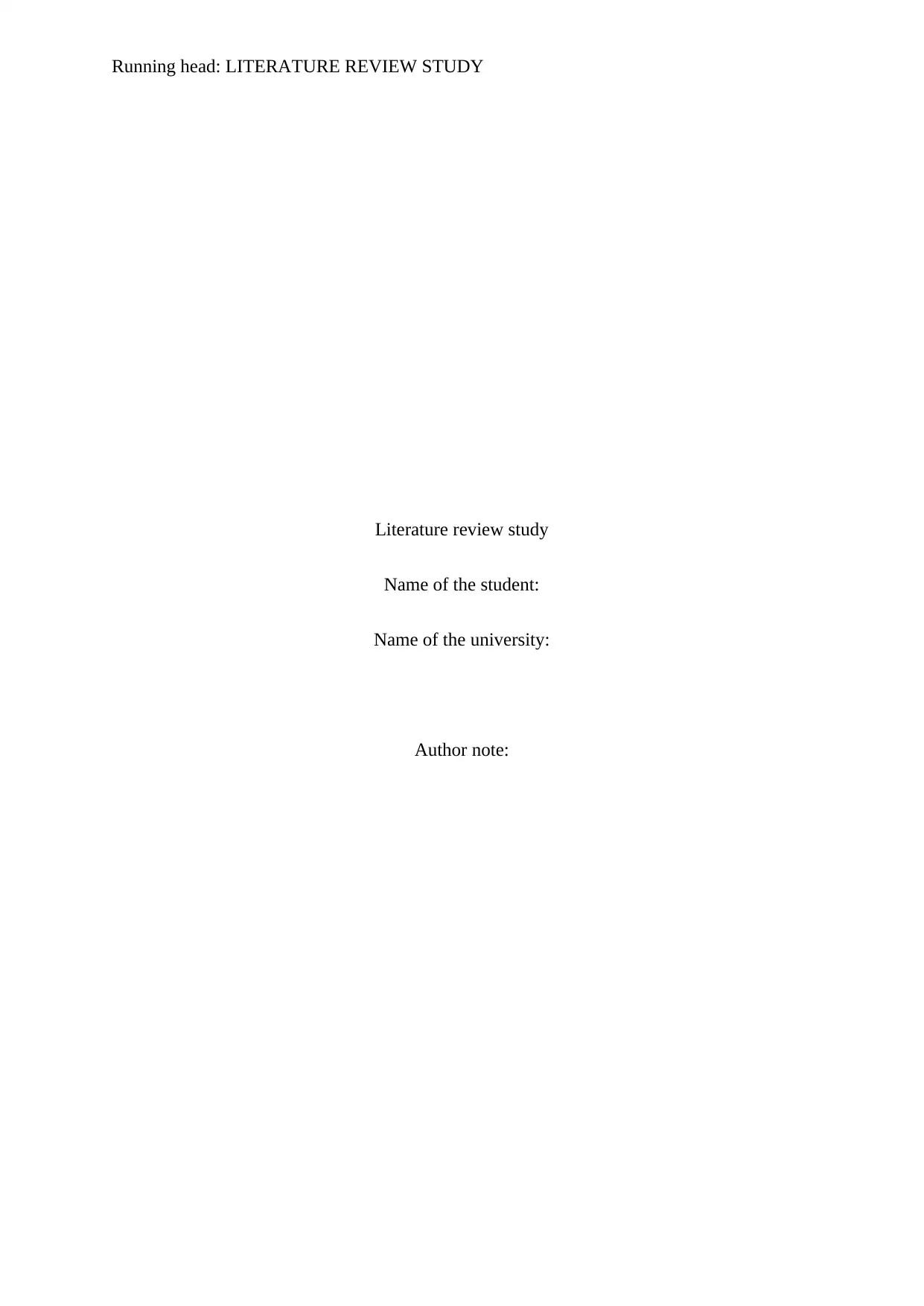
Running head: LITERATURE REVIEW STUDY
Literature review study
Name of the student:
Name of the university:
Author note:
Literature review study
Name of the student:
Name of the university:
Author note:
Secure Best Marks with AI Grader
Need help grading? Try our AI Grader for instant feedback on your assignments.
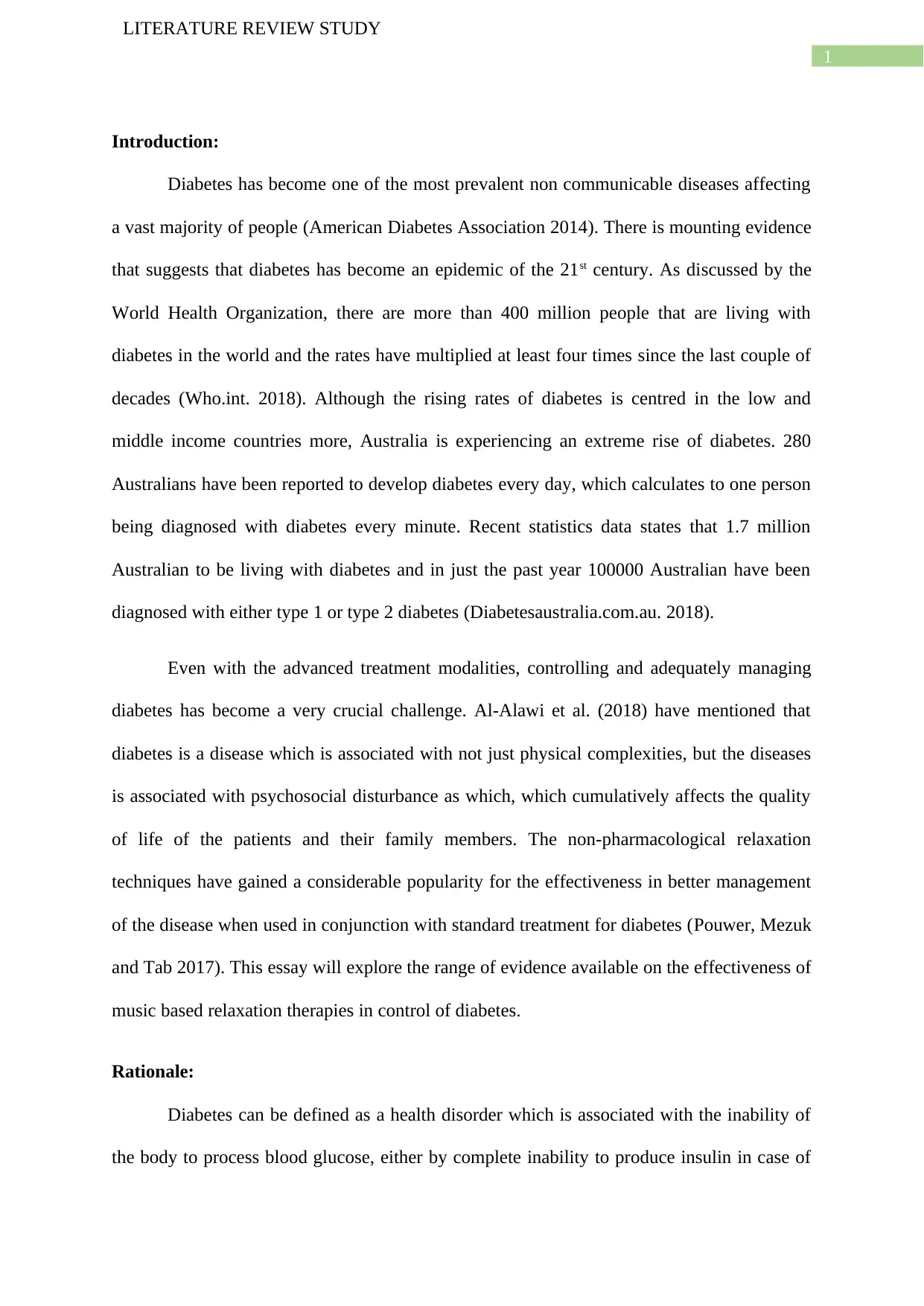
1
LITERATURE REVIEW STUDY
Introduction:
Diabetes has become one of the most prevalent non communicable diseases affecting
a vast majority of people (American Diabetes Association 2014). There is mounting evidence
that suggests that diabetes has become an epidemic of the 21st century. As discussed by the
World Health Organization, there are more than 400 million people that are living with
diabetes in the world and the rates have multiplied at least four times since the last couple of
decades (Who.int. 2018). Although the rising rates of diabetes is centred in the low and
middle income countries more, Australia is experiencing an extreme rise of diabetes. 280
Australians have been reported to develop diabetes every day, which calculates to one person
being diagnosed with diabetes every minute. Recent statistics data states that 1.7 million
Australian to be living with diabetes and in just the past year 100000 Australian have been
diagnosed with either type 1 or type 2 diabetes (Diabetesaustralia.com.au. 2018).
Even with the advanced treatment modalities, controlling and adequately managing
diabetes has become a very crucial challenge. Al-Alawi et al. (2018) have mentioned that
diabetes is a disease which is associated with not just physical complexities, but the diseases
is associated with psychosocial disturbance as which, which cumulatively affects the quality
of life of the patients and their family members. The non-pharmacological relaxation
techniques have gained a considerable popularity for the effectiveness in better management
of the disease when used in conjunction with standard treatment for diabetes (Pouwer, Mezuk
and Tab 2017). This essay will explore the range of evidence available on the effectiveness of
music based relaxation therapies in control of diabetes.
Rationale:
Diabetes can be defined as a health disorder which is associated with the inability of
the body to process blood glucose, either by complete inability to produce insulin in case of
LITERATURE REVIEW STUDY
Introduction:
Diabetes has become one of the most prevalent non communicable diseases affecting
a vast majority of people (American Diabetes Association 2014). There is mounting evidence
that suggests that diabetes has become an epidemic of the 21st century. As discussed by the
World Health Organization, there are more than 400 million people that are living with
diabetes in the world and the rates have multiplied at least four times since the last couple of
decades (Who.int. 2018). Although the rising rates of diabetes is centred in the low and
middle income countries more, Australia is experiencing an extreme rise of diabetes. 280
Australians have been reported to develop diabetes every day, which calculates to one person
being diagnosed with diabetes every minute. Recent statistics data states that 1.7 million
Australian to be living with diabetes and in just the past year 100000 Australian have been
diagnosed with either type 1 or type 2 diabetes (Diabetesaustralia.com.au. 2018).
Even with the advanced treatment modalities, controlling and adequately managing
diabetes has become a very crucial challenge. Al-Alawi et al. (2018) have mentioned that
diabetes is a disease which is associated with not just physical complexities, but the diseases
is associated with psychosocial disturbance as which, which cumulatively affects the quality
of life of the patients and their family members. The non-pharmacological relaxation
techniques have gained a considerable popularity for the effectiveness in better management
of the disease when used in conjunction with standard treatment for diabetes (Pouwer, Mezuk
and Tab 2017). This essay will explore the range of evidence available on the effectiveness of
music based relaxation therapies in control of diabetes.
Rationale:
Diabetes can be defined as a health disorder which is associated with the inability of
the body to process blood glucose, either by complete inability to produce insulin in case of
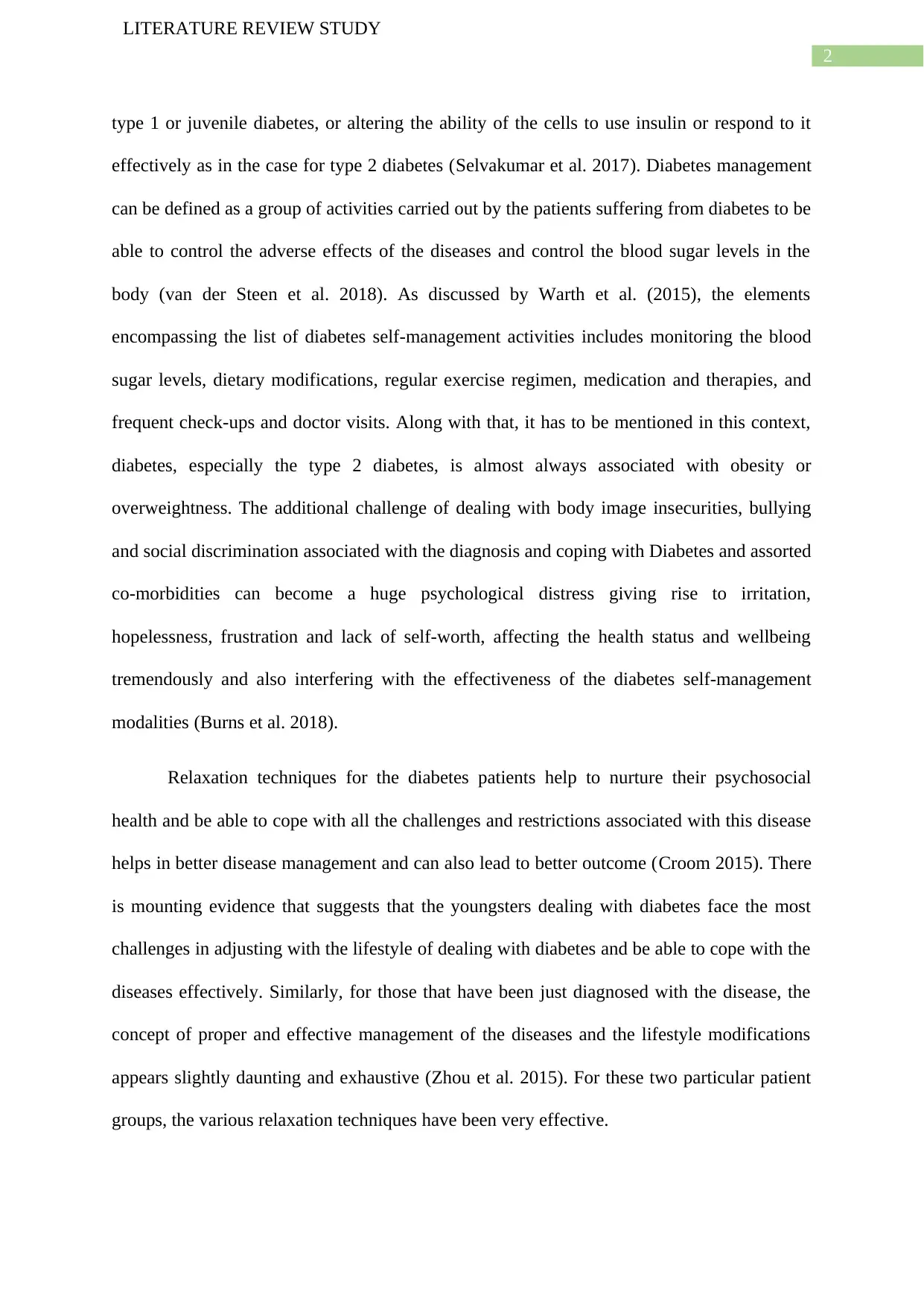
2
LITERATURE REVIEW STUDY
type 1 or juvenile diabetes, or altering the ability of the cells to use insulin or respond to it
effectively as in the case for type 2 diabetes (Selvakumar et al. 2017). Diabetes management
can be defined as a group of activities carried out by the patients suffering from diabetes to be
able to control the adverse effects of the diseases and control the blood sugar levels in the
body (van der Steen et al. 2018). As discussed by Warth et al. (2015), the elements
encompassing the list of diabetes self-management activities includes monitoring the blood
sugar levels, dietary modifications, regular exercise regimen, medication and therapies, and
frequent check-ups and doctor visits. Along with that, it has to be mentioned in this context,
diabetes, especially the type 2 diabetes, is almost always associated with obesity or
overweightness. The additional challenge of dealing with body image insecurities, bullying
and social discrimination associated with the diagnosis and coping with Diabetes and assorted
co-morbidities can become a huge psychological distress giving rise to irritation,
hopelessness, frustration and lack of self-worth, affecting the health status and wellbeing
tremendously and also interfering with the effectiveness of the diabetes self-management
modalities (Burns et al. 2018).
Relaxation techniques for the diabetes patients help to nurture their psychosocial
health and be able to cope with all the challenges and restrictions associated with this disease
helps in better disease management and can also lead to better outcome (Croom 2015). There
is mounting evidence that suggests that the youngsters dealing with diabetes face the most
challenges in adjusting with the lifestyle of dealing with diabetes and be able to cope with the
diseases effectively. Similarly, for those that have been just diagnosed with the disease, the
concept of proper and effective management of the diseases and the lifestyle modifications
appears slightly daunting and exhaustive (Zhou et al. 2015). For these two particular patient
groups, the various relaxation techniques have been very effective.
LITERATURE REVIEW STUDY
type 1 or juvenile diabetes, or altering the ability of the cells to use insulin or respond to it
effectively as in the case for type 2 diabetes (Selvakumar et al. 2017). Diabetes management
can be defined as a group of activities carried out by the patients suffering from diabetes to be
able to control the adverse effects of the diseases and control the blood sugar levels in the
body (van der Steen et al. 2018). As discussed by Warth et al. (2015), the elements
encompassing the list of diabetes self-management activities includes monitoring the blood
sugar levels, dietary modifications, regular exercise regimen, medication and therapies, and
frequent check-ups and doctor visits. Along with that, it has to be mentioned in this context,
diabetes, especially the type 2 diabetes, is almost always associated with obesity or
overweightness. The additional challenge of dealing with body image insecurities, bullying
and social discrimination associated with the diagnosis and coping with Diabetes and assorted
co-morbidities can become a huge psychological distress giving rise to irritation,
hopelessness, frustration and lack of self-worth, affecting the health status and wellbeing
tremendously and also interfering with the effectiveness of the diabetes self-management
modalities (Burns et al. 2018).
Relaxation techniques for the diabetes patients help to nurture their psychosocial
health and be able to cope with all the challenges and restrictions associated with this disease
helps in better disease management and can also lead to better outcome (Croom 2015). There
is mounting evidence that suggests that the youngsters dealing with diabetes face the most
challenges in adjusting with the lifestyle of dealing with diabetes and be able to cope with the
diseases effectively. Similarly, for those that have been just diagnosed with the disease, the
concept of proper and effective management of the diseases and the lifestyle modifications
appears slightly daunting and exhaustive (Zhou et al. 2015). For these two particular patient
groups, the various relaxation techniques have been very effective.
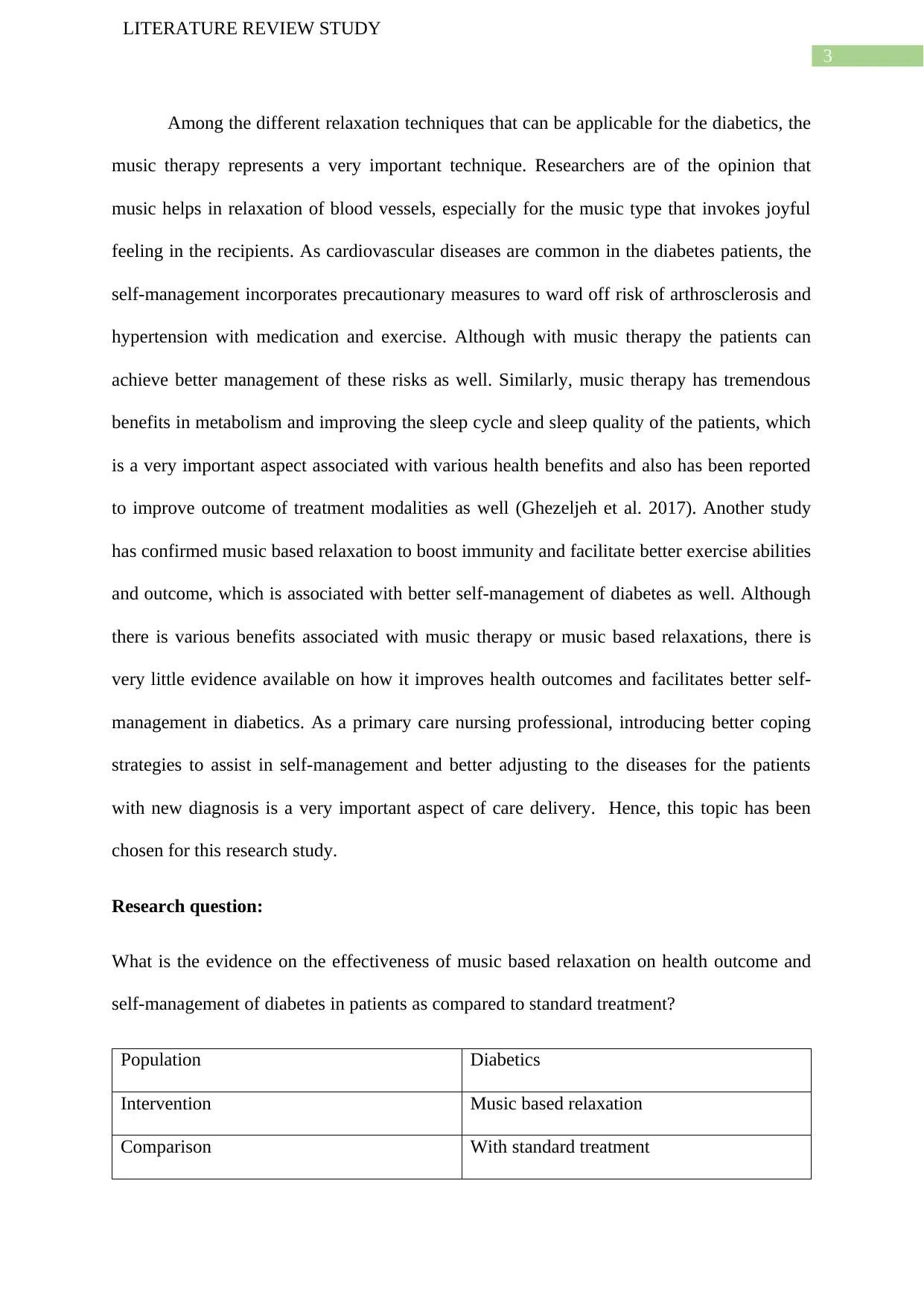
3
LITERATURE REVIEW STUDY
Among the different relaxation techniques that can be applicable for the diabetics, the
music therapy represents a very important technique. Researchers are of the opinion that
music helps in relaxation of blood vessels, especially for the music type that invokes joyful
feeling in the recipients. As cardiovascular diseases are common in the diabetes patients, the
self-management incorporates precautionary measures to ward off risk of arthrosclerosis and
hypertension with medication and exercise. Although with music therapy the patients can
achieve better management of these risks as well. Similarly, music therapy has tremendous
benefits in metabolism and improving the sleep cycle and sleep quality of the patients, which
is a very important aspect associated with various health benefits and also has been reported
to improve outcome of treatment modalities as well (Ghezeljeh et al. 2017). Another study
has confirmed music based relaxation to boost immunity and facilitate better exercise abilities
and outcome, which is associated with better self-management of diabetes as well. Although
there is various benefits associated with music therapy or music based relaxations, there is
very little evidence available on how it improves health outcomes and facilitates better self-
management in diabetics. As a primary care nursing professional, introducing better coping
strategies to assist in self-management and better adjusting to the diseases for the patients
with new diagnosis is a very important aspect of care delivery. Hence, this topic has been
chosen for this research study.
Research question:
What is the evidence on the effectiveness of music based relaxation on health outcome and
self-management of diabetes in patients as compared to standard treatment?
Population Diabetics
Intervention Music based relaxation
Comparison With standard treatment
LITERATURE REVIEW STUDY
Among the different relaxation techniques that can be applicable for the diabetics, the
music therapy represents a very important technique. Researchers are of the opinion that
music helps in relaxation of blood vessels, especially for the music type that invokes joyful
feeling in the recipients. As cardiovascular diseases are common in the diabetes patients, the
self-management incorporates precautionary measures to ward off risk of arthrosclerosis and
hypertension with medication and exercise. Although with music therapy the patients can
achieve better management of these risks as well. Similarly, music therapy has tremendous
benefits in metabolism and improving the sleep cycle and sleep quality of the patients, which
is a very important aspect associated with various health benefits and also has been reported
to improve outcome of treatment modalities as well (Ghezeljeh et al. 2017). Another study
has confirmed music based relaxation to boost immunity and facilitate better exercise abilities
and outcome, which is associated with better self-management of diabetes as well. Although
there is various benefits associated with music therapy or music based relaxations, there is
very little evidence available on how it improves health outcomes and facilitates better self-
management in diabetics. As a primary care nursing professional, introducing better coping
strategies to assist in self-management and better adjusting to the diseases for the patients
with new diagnosis is a very important aspect of care delivery. Hence, this topic has been
chosen for this research study.
Research question:
What is the evidence on the effectiveness of music based relaxation on health outcome and
self-management of diabetes in patients as compared to standard treatment?
Population Diabetics
Intervention Music based relaxation
Comparison With standard treatment
Secure Best Marks with AI Grader
Need help grading? Try our AI Grader for instant feedback on your assignments.
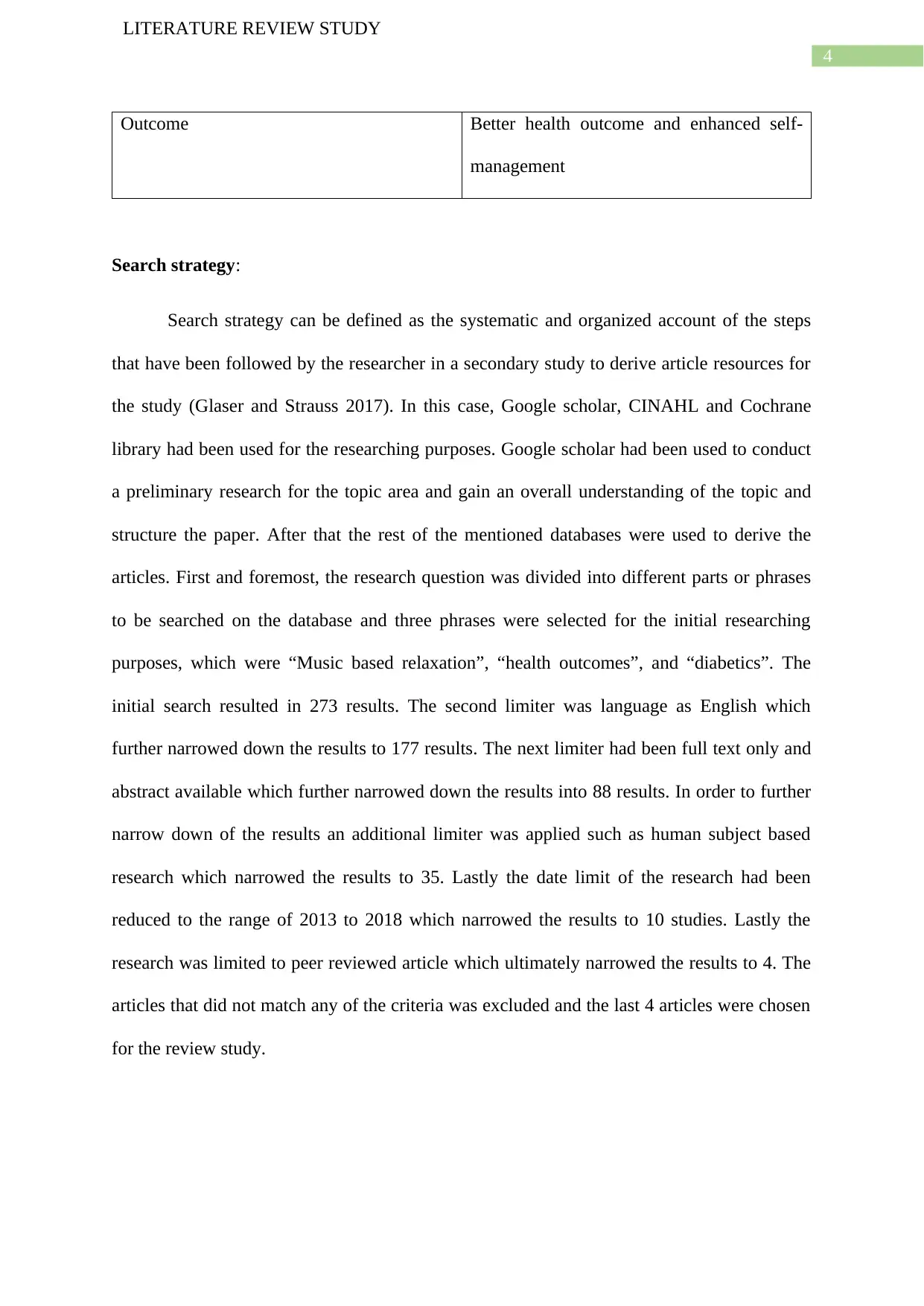
4
LITERATURE REVIEW STUDY
Outcome Better health outcome and enhanced self-
management
Search strategy:
Search strategy can be defined as the systematic and organized account of the steps
that have been followed by the researcher in a secondary study to derive article resources for
the study (Glaser and Strauss 2017). In this case, Google scholar, CINAHL and Cochrane
library had been used for the researching purposes. Google scholar had been used to conduct
a preliminary research for the topic area and gain an overall understanding of the topic and
structure the paper. After that the rest of the mentioned databases were used to derive the
articles. First and foremost, the research question was divided into different parts or phrases
to be searched on the database and three phrases were selected for the initial researching
purposes, which were “Music based relaxation”, “health outcomes”, and “diabetics”. The
initial search resulted in 273 results. The second limiter was language as English which
further narrowed down the results to 177 results. The next limiter had been full text only and
abstract available which further narrowed down the results into 88 results. In order to further
narrow down of the results an additional limiter was applied such as human subject based
research which narrowed the results to 35. Lastly the date limit of the research had been
reduced to the range of 2013 to 2018 which narrowed the results to 10 studies. Lastly the
research was limited to peer reviewed article which ultimately narrowed the results to 4. The
articles that did not match any of the criteria was excluded and the last 4 articles were chosen
for the review study.
LITERATURE REVIEW STUDY
Outcome Better health outcome and enhanced self-
management
Search strategy:
Search strategy can be defined as the systematic and organized account of the steps
that have been followed by the researcher in a secondary study to derive article resources for
the study (Glaser and Strauss 2017). In this case, Google scholar, CINAHL and Cochrane
library had been used for the researching purposes. Google scholar had been used to conduct
a preliminary research for the topic area and gain an overall understanding of the topic and
structure the paper. After that the rest of the mentioned databases were used to derive the
articles. First and foremost, the research question was divided into different parts or phrases
to be searched on the database and three phrases were selected for the initial researching
purposes, which were “Music based relaxation”, “health outcomes”, and “diabetics”. The
initial search resulted in 273 results. The second limiter was language as English which
further narrowed down the results to 177 results. The next limiter had been full text only and
abstract available which further narrowed down the results into 88 results. In order to further
narrow down of the results an additional limiter was applied such as human subject based
research which narrowed the results to 35. Lastly the date limit of the research had been
reduced to the range of 2013 to 2018 which narrowed the results to 10 studies. Lastly the
research was limited to peer reviewed article which ultimately narrowed the results to 4. The
articles that did not match any of the criteria was excluded and the last 4 articles were chosen
for the review study.
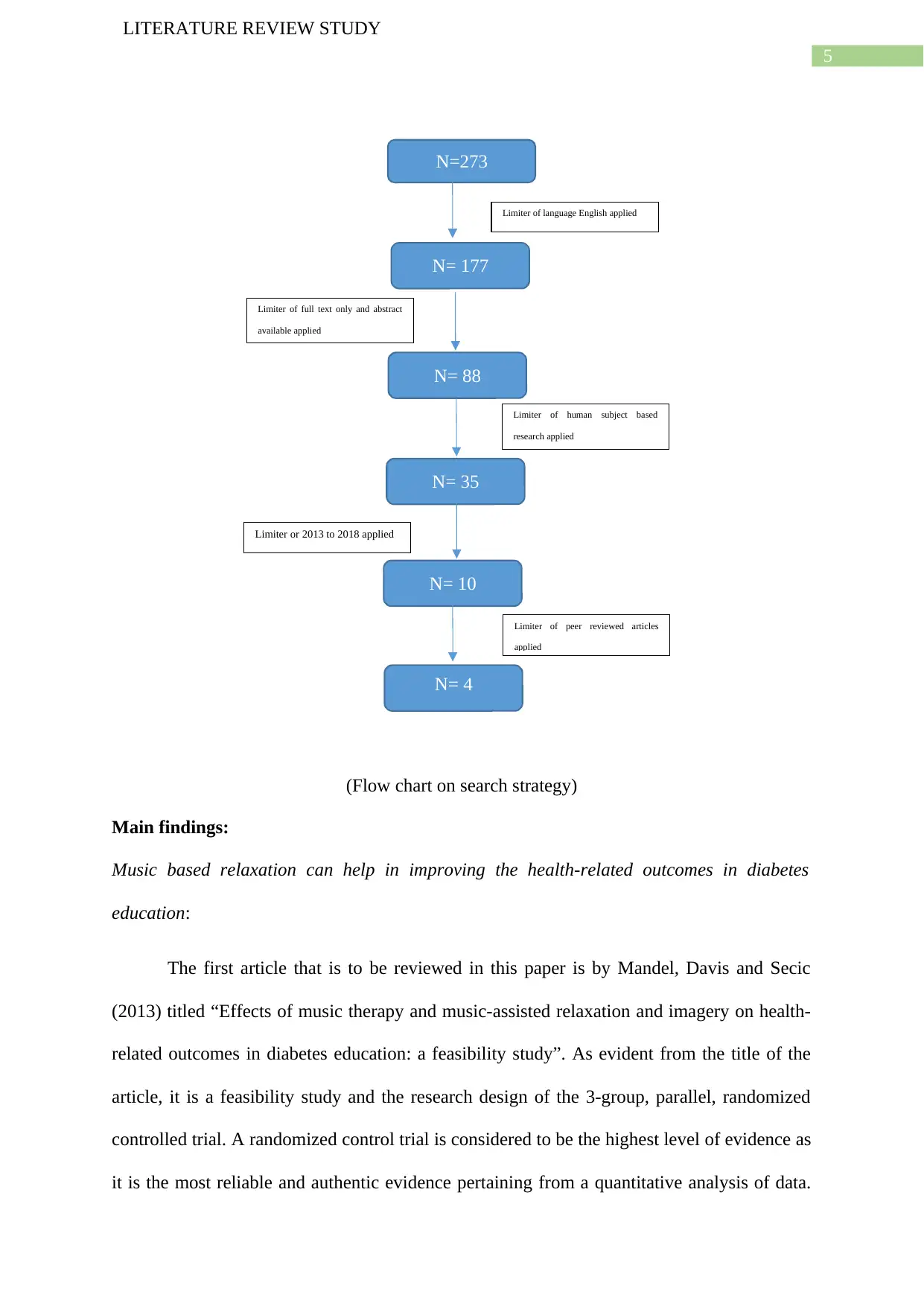
5
LITERATURE REVIEW STUDY
(Flow chart on search strategy)
Main findings:
Music based relaxation can help in improving the health-related outcomes in diabetes
education:
The first article that is to be reviewed in this paper is by Mandel, Davis and Secic
(2013) titled “Effects of music therapy and music-assisted relaxation and imagery on health-
related outcomes in diabetes education: a feasibility study”. As evident from the title of the
article, it is a feasibility study and the research design of the 3-group, parallel, randomized
controlled trial. A randomized control trial is considered to be the highest level of evidence as
it is the most reliable and authentic evidence pertaining from a quantitative analysis of data.
N=273
N= 177
N= 88
N= 4
N= 10
N= 35
Limiter of language English applied
Limiter of full text only and abstract
available applied
Limiter of human subject based
research applied
Limiter or 2013 to 2018 applied
Limiter of peer reviewed articles
applied
LITERATURE REVIEW STUDY
(Flow chart on search strategy)
Main findings:
Music based relaxation can help in improving the health-related outcomes in diabetes
education:
The first article that is to be reviewed in this paper is by Mandel, Davis and Secic
(2013) titled “Effects of music therapy and music-assisted relaxation and imagery on health-
related outcomes in diabetes education: a feasibility study”. As evident from the title of the
article, it is a feasibility study and the research design of the 3-group, parallel, randomized
controlled trial. A randomized control trial is considered to be the highest level of evidence as
it is the most reliable and authentic evidence pertaining from a quantitative analysis of data.
N=273
N= 177
N= 88
N= 4
N= 10
N= 35
Limiter of language English applied
Limiter of full text only and abstract
available applied
Limiter of human subject based
research applied
Limiter or 2013 to 2018 applied
Limiter of peer reviewed articles
applied
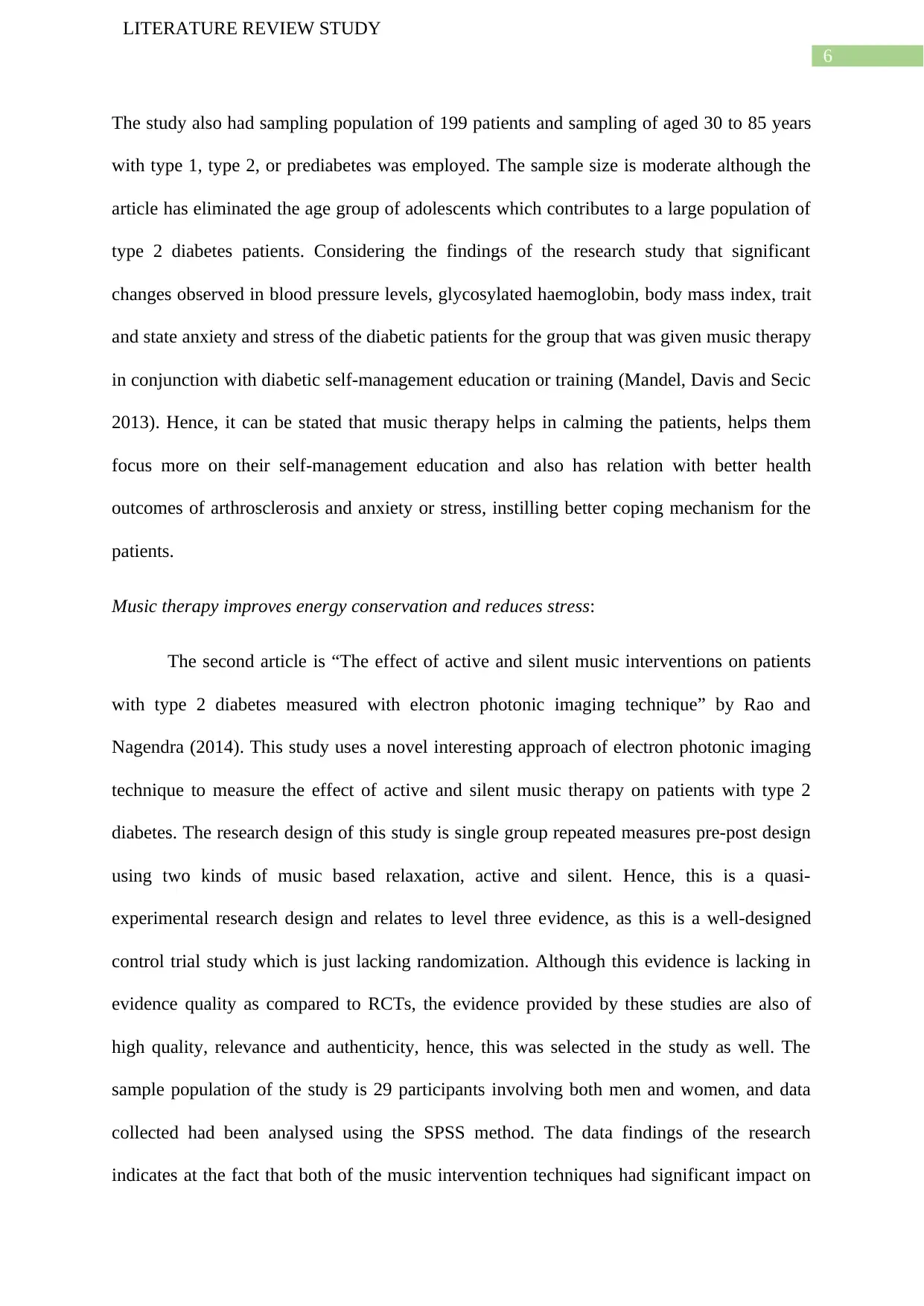
6
LITERATURE REVIEW STUDY
The study also had sampling population of 199 patients and sampling of aged 30 to 85 years
with type 1, type 2, or prediabetes was employed. The sample size is moderate although the
article has eliminated the age group of adolescents which contributes to a large population of
type 2 diabetes patients. Considering the findings of the research study that significant
changes observed in blood pressure levels, glycosylated haemoglobin, body mass index, trait
and state anxiety and stress of the diabetic patients for the group that was given music therapy
in conjunction with diabetic self-management education or training (Mandel, Davis and Secic
2013). Hence, it can be stated that music therapy helps in calming the patients, helps them
focus more on their self-management education and also has relation with better health
outcomes of arthrosclerosis and anxiety or stress, instilling better coping mechanism for the
patients.
Music therapy improves energy conservation and reduces stress:
The second article is “The effect of active and silent music interventions on patients
with type 2 diabetes measured with electron photonic imaging technique” by Rao and
Nagendra (2014). This study uses a novel interesting approach of electron photonic imaging
technique to measure the effect of active and silent music therapy on patients with type 2
diabetes. The research design of this study is single group repeated measures pre-post design
using two kinds of music based relaxation, active and silent. Hence, this is a quasi-
experimental research design and relates to level three evidence, as this is a well-designed
control trial study which is just lacking randomization. Although this evidence is lacking in
evidence quality as compared to RCTs, the evidence provided by these studies are also of
high quality, relevance and authenticity, hence, this was selected in the study as well. The
sample population of the study is 29 participants involving both men and women, and data
collected had been analysed using the SPSS method. The data findings of the research
indicates at the fact that both of the music intervention techniques had significant impact on
LITERATURE REVIEW STUDY
The study also had sampling population of 199 patients and sampling of aged 30 to 85 years
with type 1, type 2, or prediabetes was employed. The sample size is moderate although the
article has eliminated the age group of adolescents which contributes to a large population of
type 2 diabetes patients. Considering the findings of the research study that significant
changes observed in blood pressure levels, glycosylated haemoglobin, body mass index, trait
and state anxiety and stress of the diabetic patients for the group that was given music therapy
in conjunction with diabetic self-management education or training (Mandel, Davis and Secic
2013). Hence, it can be stated that music therapy helps in calming the patients, helps them
focus more on their self-management education and also has relation with better health
outcomes of arthrosclerosis and anxiety or stress, instilling better coping mechanism for the
patients.
Music therapy improves energy conservation and reduces stress:
The second article is “The effect of active and silent music interventions on patients
with type 2 diabetes measured with electron photonic imaging technique” by Rao and
Nagendra (2014). This study uses a novel interesting approach of electron photonic imaging
technique to measure the effect of active and silent music therapy on patients with type 2
diabetes. The research design of this study is single group repeated measures pre-post design
using two kinds of music based relaxation, active and silent. Hence, this is a quasi-
experimental research design and relates to level three evidence, as this is a well-designed
control trial study which is just lacking randomization. Although this evidence is lacking in
evidence quality as compared to RCTs, the evidence provided by these studies are also of
high quality, relevance and authenticity, hence, this was selected in the study as well. The
sample population of the study is 29 participants involving both men and women, and data
collected had been analysed using the SPSS method. The data findings of the research
indicates at the fact that both of the music intervention techniques had significant impact on
Paraphrase This Document
Need a fresh take? Get an instant paraphrase of this document with our AI Paraphraser
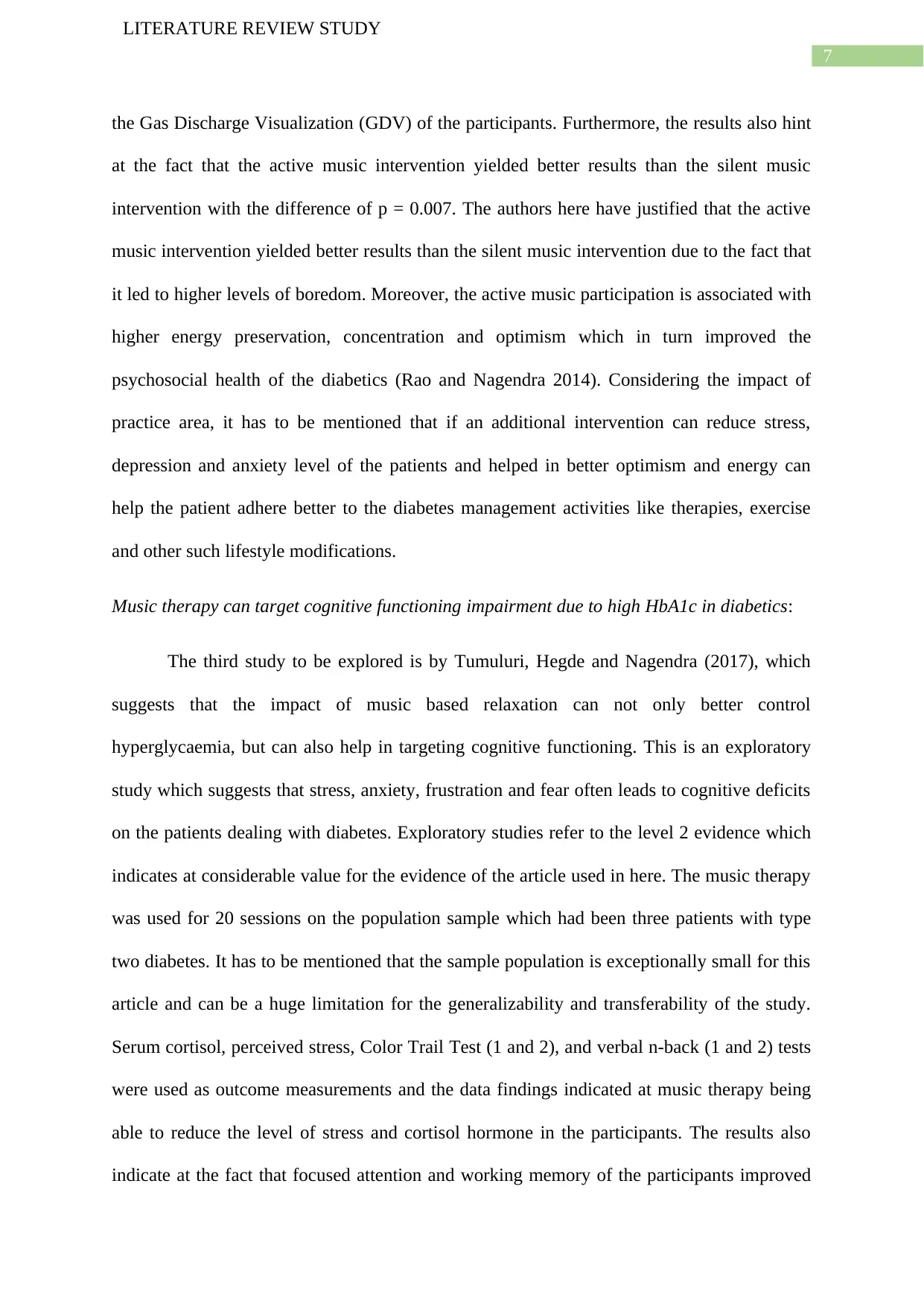
7
LITERATURE REVIEW STUDY
the Gas Discharge Visualization (GDV) of the participants. Furthermore, the results also hint
at the fact that the active music intervention yielded better results than the silent music
intervention with the difference of p = 0.007. The authors here have justified that the active
music intervention yielded better results than the silent music intervention due to the fact that
it led to higher levels of boredom. Moreover, the active music participation is associated with
higher energy preservation, concentration and optimism which in turn improved the
psychosocial health of the diabetics (Rao and Nagendra 2014). Considering the impact of
practice area, it has to be mentioned that if an additional intervention can reduce stress,
depression and anxiety level of the patients and helped in better optimism and energy can
help the patient adhere better to the diabetes management activities like therapies, exercise
and other such lifestyle modifications.
Music therapy can target cognitive functioning impairment due to high HbA1c in diabetics:
The third study to be explored is by Tumuluri, Hegde and Nagendra (2017), which
suggests that the impact of music based relaxation can not only better control
hyperglycaemia, but can also help in targeting cognitive functioning. This is an exploratory
study which suggests that stress, anxiety, frustration and fear often leads to cognitive deficits
on the patients dealing with diabetes. Exploratory studies refer to the level 2 evidence which
indicates at considerable value for the evidence of the article used in here. The music therapy
was used for 20 sessions on the population sample which had been three patients with type
two diabetes. It has to be mentioned that the sample population is exceptionally small for this
article and can be a huge limitation for the generalizability and transferability of the study.
Serum cortisol, perceived stress, Color Trail Test (1 and 2), and verbal n-back (1 and 2) tests
were used as outcome measurements and the data findings indicated at music therapy being
able to reduce the level of stress and cortisol hormone in the participants. The results also
indicate at the fact that focused attention and working memory of the participants improved
LITERATURE REVIEW STUDY
the Gas Discharge Visualization (GDV) of the participants. Furthermore, the results also hint
at the fact that the active music intervention yielded better results than the silent music
intervention with the difference of p = 0.007. The authors here have justified that the active
music intervention yielded better results than the silent music intervention due to the fact that
it led to higher levels of boredom. Moreover, the active music participation is associated with
higher energy preservation, concentration and optimism which in turn improved the
psychosocial health of the diabetics (Rao and Nagendra 2014). Considering the impact of
practice area, it has to be mentioned that if an additional intervention can reduce stress,
depression and anxiety level of the patients and helped in better optimism and energy can
help the patient adhere better to the diabetes management activities like therapies, exercise
and other such lifestyle modifications.
Music therapy can target cognitive functioning impairment due to high HbA1c in diabetics:
The third study to be explored is by Tumuluri, Hegde and Nagendra (2017), which
suggests that the impact of music based relaxation can not only better control
hyperglycaemia, but can also help in targeting cognitive functioning. This is an exploratory
study which suggests that stress, anxiety, frustration and fear often leads to cognitive deficits
on the patients dealing with diabetes. Exploratory studies refer to the level 2 evidence which
indicates at considerable value for the evidence of the article used in here. The music therapy
was used for 20 sessions on the population sample which had been three patients with type
two diabetes. It has to be mentioned that the sample population is exceptionally small for this
article and can be a huge limitation for the generalizability and transferability of the study.
Serum cortisol, perceived stress, Color Trail Test (1 and 2), and verbal n-back (1 and 2) tests
were used as outcome measurements and the data findings indicated at music therapy being
able to reduce the level of stress and cortisol hormone in the participants. The results also
indicate at the fact that focused attention and working memory of the participants improved
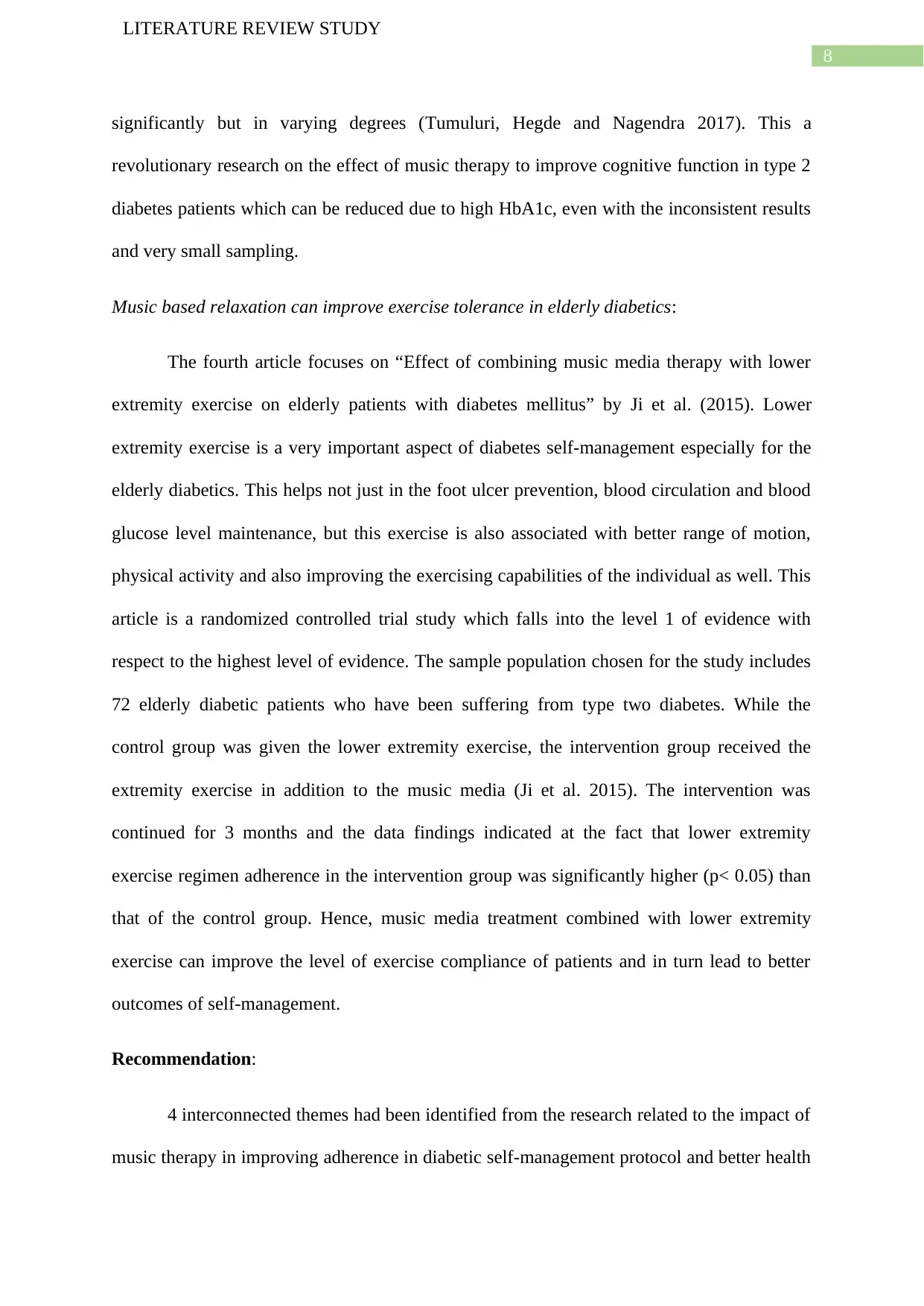
8
LITERATURE REVIEW STUDY
significantly but in varying degrees (Tumuluri, Hegde and Nagendra 2017). This a
revolutionary research on the effect of music therapy to improve cognitive function in type 2
diabetes patients which can be reduced due to high HbA1c, even with the inconsistent results
and very small sampling.
Music based relaxation can improve exercise tolerance in elderly diabetics:
The fourth article focuses on “Effect of combining music media therapy with lower
extremity exercise on elderly patients with diabetes mellitus” by Ji et al. (2015). Lower
extremity exercise is a very important aspect of diabetes self-management especially for the
elderly diabetics. This helps not just in the foot ulcer prevention, blood circulation and blood
glucose level maintenance, but this exercise is also associated with better range of motion,
physical activity and also improving the exercising capabilities of the individual as well. This
article is a randomized controlled trial study which falls into the level 1 of evidence with
respect to the highest level of evidence. The sample population chosen for the study includes
72 elderly diabetic patients who have been suffering from type two diabetes. While the
control group was given the lower extremity exercise, the intervention group received the
extremity exercise in addition to the music media (Ji et al. 2015). The intervention was
continued for 3 months and the data findings indicated at the fact that lower extremity
exercise regimen adherence in the intervention group was significantly higher (p< 0.05) than
that of the control group. Hence, music media treatment combined with lower extremity
exercise can improve the level of exercise compliance of patients and in turn lead to better
outcomes of self-management.
Recommendation:
4 interconnected themes had been identified from the research related to the impact of
music therapy in improving adherence in diabetic self-management protocol and better health
LITERATURE REVIEW STUDY
significantly but in varying degrees (Tumuluri, Hegde and Nagendra 2017). This a
revolutionary research on the effect of music therapy to improve cognitive function in type 2
diabetes patients which can be reduced due to high HbA1c, even with the inconsistent results
and very small sampling.
Music based relaxation can improve exercise tolerance in elderly diabetics:
The fourth article focuses on “Effect of combining music media therapy with lower
extremity exercise on elderly patients with diabetes mellitus” by Ji et al. (2015). Lower
extremity exercise is a very important aspect of diabetes self-management especially for the
elderly diabetics. This helps not just in the foot ulcer prevention, blood circulation and blood
glucose level maintenance, but this exercise is also associated with better range of motion,
physical activity and also improving the exercising capabilities of the individual as well. This
article is a randomized controlled trial study which falls into the level 1 of evidence with
respect to the highest level of evidence. The sample population chosen for the study includes
72 elderly diabetic patients who have been suffering from type two diabetes. While the
control group was given the lower extremity exercise, the intervention group received the
extremity exercise in addition to the music media (Ji et al. 2015). The intervention was
continued for 3 months and the data findings indicated at the fact that lower extremity
exercise regimen adherence in the intervention group was significantly higher (p< 0.05) than
that of the control group. Hence, music media treatment combined with lower extremity
exercise can improve the level of exercise compliance of patients and in turn lead to better
outcomes of self-management.
Recommendation:
4 interconnected themes had been identified from the research related to the impact of
music therapy in improving adherence in diabetic self-management protocol and better health
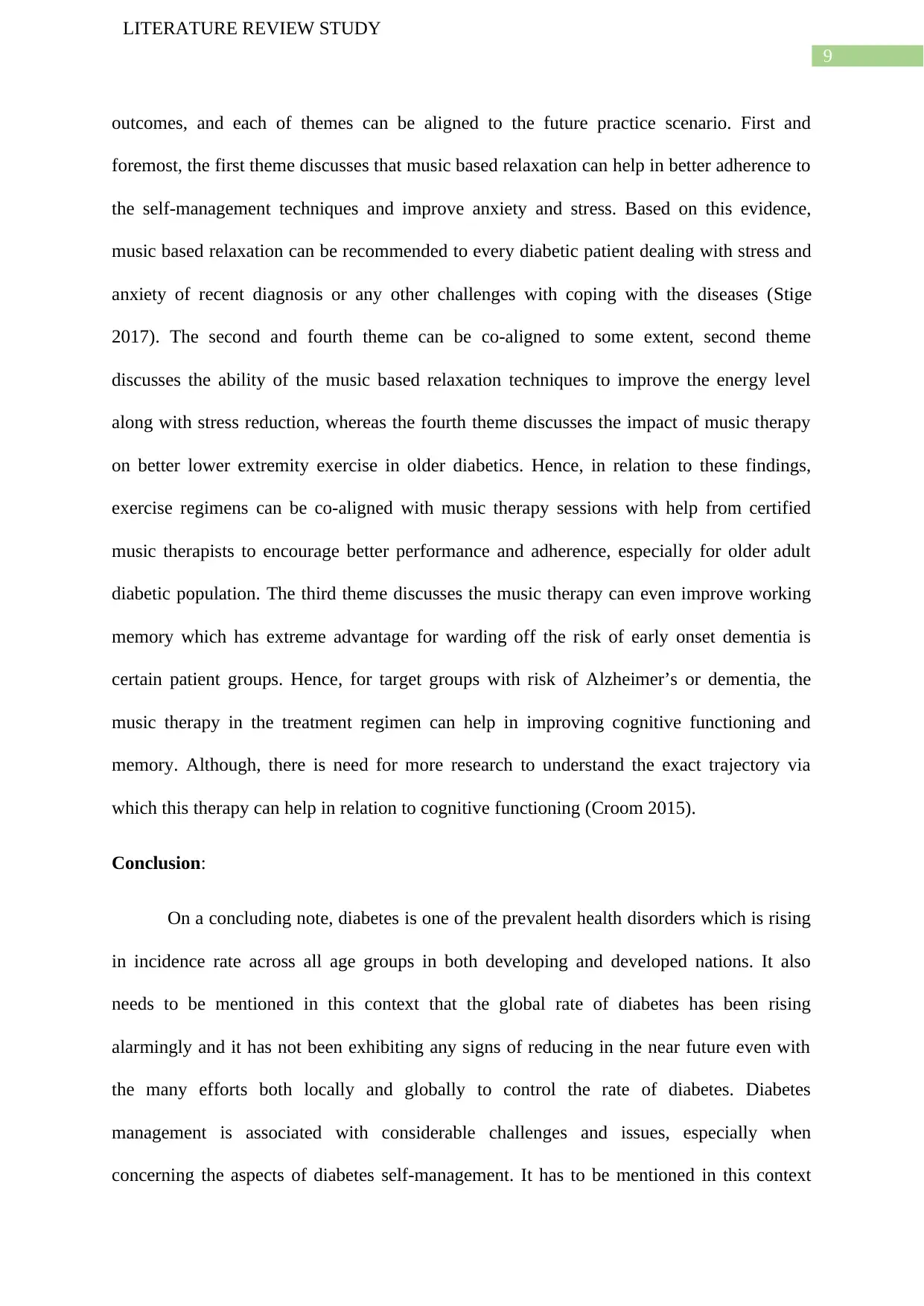
9
LITERATURE REVIEW STUDY
outcomes, and each of themes can be aligned to the future practice scenario. First and
foremost, the first theme discusses that music based relaxation can help in better adherence to
the self-management techniques and improve anxiety and stress. Based on this evidence,
music based relaxation can be recommended to every diabetic patient dealing with stress and
anxiety of recent diagnosis or any other challenges with coping with the diseases (Stige
2017). The second and fourth theme can be co-aligned to some extent, second theme
discusses the ability of the music based relaxation techniques to improve the energy level
along with stress reduction, whereas the fourth theme discusses the impact of music therapy
on better lower extremity exercise in older diabetics. Hence, in relation to these findings,
exercise regimens can be co-aligned with music therapy sessions with help from certified
music therapists to encourage better performance and adherence, especially for older adult
diabetic population. The third theme discusses the music therapy can even improve working
memory which has extreme advantage for warding off the risk of early onset dementia is
certain patient groups. Hence, for target groups with risk of Alzheimer’s or dementia, the
music therapy in the treatment regimen can help in improving cognitive functioning and
memory. Although, there is need for more research to understand the exact trajectory via
which this therapy can help in relation to cognitive functioning (Croom 2015).
Conclusion:
On a concluding note, diabetes is one of the prevalent health disorders which is rising
in incidence rate across all age groups in both developing and developed nations. It also
needs to be mentioned in this context that the global rate of diabetes has been rising
alarmingly and it has not been exhibiting any signs of reducing in the near future even with
the many efforts both locally and globally to control the rate of diabetes. Diabetes
management is associated with considerable challenges and issues, especially when
concerning the aspects of diabetes self-management. It has to be mentioned in this context
LITERATURE REVIEW STUDY
outcomes, and each of themes can be aligned to the future practice scenario. First and
foremost, the first theme discusses that music based relaxation can help in better adherence to
the self-management techniques and improve anxiety and stress. Based on this evidence,
music based relaxation can be recommended to every diabetic patient dealing with stress and
anxiety of recent diagnosis or any other challenges with coping with the diseases (Stige
2017). The second and fourth theme can be co-aligned to some extent, second theme
discusses the ability of the music based relaxation techniques to improve the energy level
along with stress reduction, whereas the fourth theme discusses the impact of music therapy
on better lower extremity exercise in older diabetics. Hence, in relation to these findings,
exercise regimens can be co-aligned with music therapy sessions with help from certified
music therapists to encourage better performance and adherence, especially for older adult
diabetic population. The third theme discusses the music therapy can even improve working
memory which has extreme advantage for warding off the risk of early onset dementia is
certain patient groups. Hence, for target groups with risk of Alzheimer’s or dementia, the
music therapy in the treatment regimen can help in improving cognitive functioning and
memory. Although, there is need for more research to understand the exact trajectory via
which this therapy can help in relation to cognitive functioning (Croom 2015).
Conclusion:
On a concluding note, diabetes is one of the prevalent health disorders which is rising
in incidence rate across all age groups in both developing and developed nations. It also
needs to be mentioned in this context that the global rate of diabetes has been rising
alarmingly and it has not been exhibiting any signs of reducing in the near future even with
the many efforts both locally and globally to control the rate of diabetes. Diabetes
management is associated with considerable challenges and issues, especially when
concerning the aspects of diabetes self-management. It has to be mentioned in this context
Secure Best Marks with AI Grader
Need help grading? Try our AI Grader for instant feedback on your assignments.
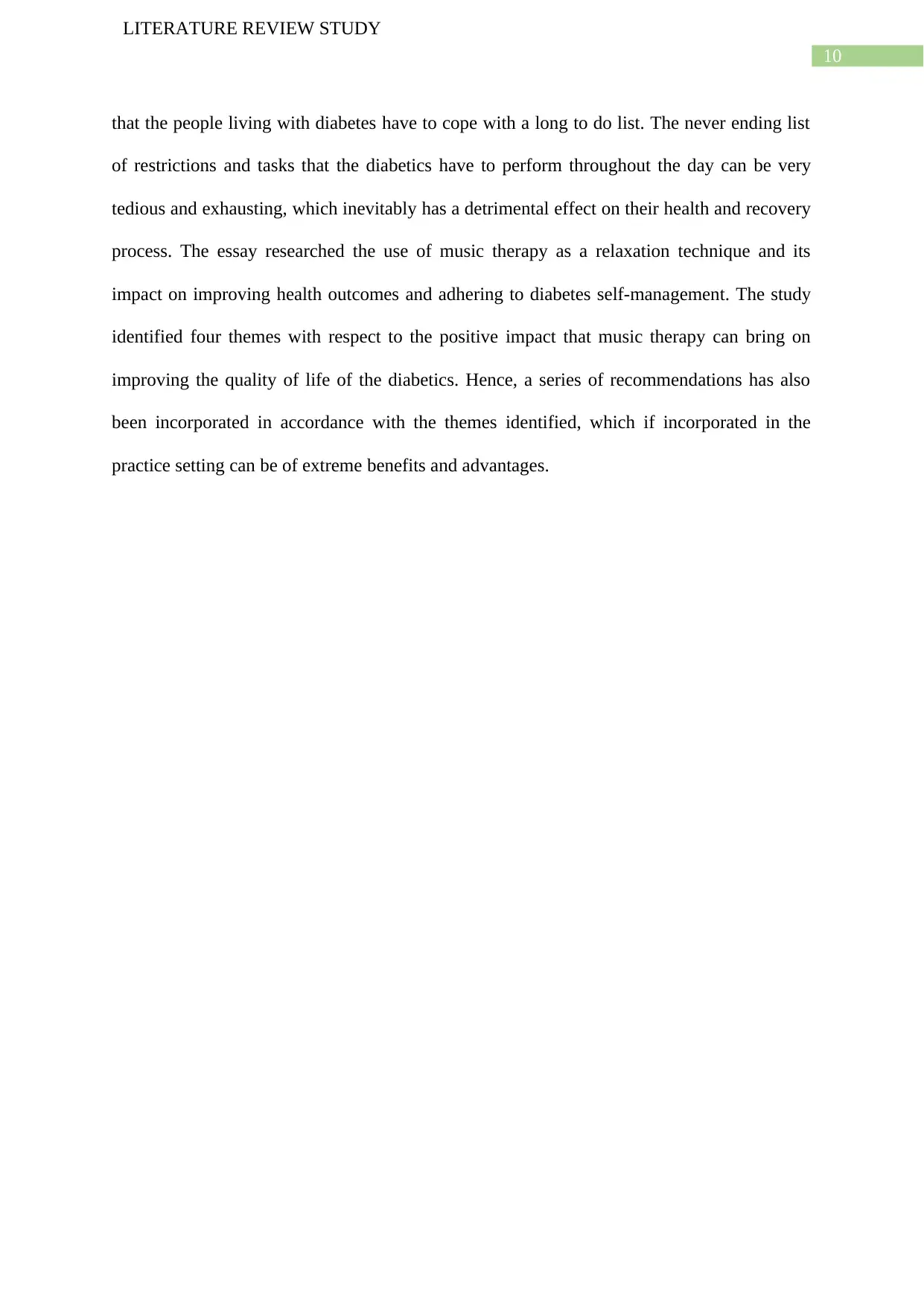
10
LITERATURE REVIEW STUDY
that the people living with diabetes have to cope with a long to do list. The never ending list
of restrictions and tasks that the diabetics have to perform throughout the day can be very
tedious and exhausting, which inevitably has a detrimental effect on their health and recovery
process. The essay researched the use of music therapy as a relaxation technique and its
impact on improving health outcomes and adhering to diabetes self-management. The study
identified four themes with respect to the positive impact that music therapy can bring on
improving the quality of life of the diabetics. Hence, a series of recommendations has also
been incorporated in accordance with the themes identified, which if incorporated in the
practice setting can be of extreme benefits and advantages.
LITERATURE REVIEW STUDY
that the people living with diabetes have to cope with a long to do list. The never ending list
of restrictions and tasks that the diabetics have to perform throughout the day can be very
tedious and exhausting, which inevitably has a detrimental effect on their health and recovery
process. The essay researched the use of music therapy as a relaxation technique and its
impact on improving health outcomes and adhering to diabetes self-management. The study
identified four themes with respect to the positive impact that music therapy can bring on
improving the quality of life of the diabetics. Hence, a series of recommendations has also
been incorporated in accordance with the themes identified, which if incorporated in the
practice setting can be of extreme benefits and advantages.
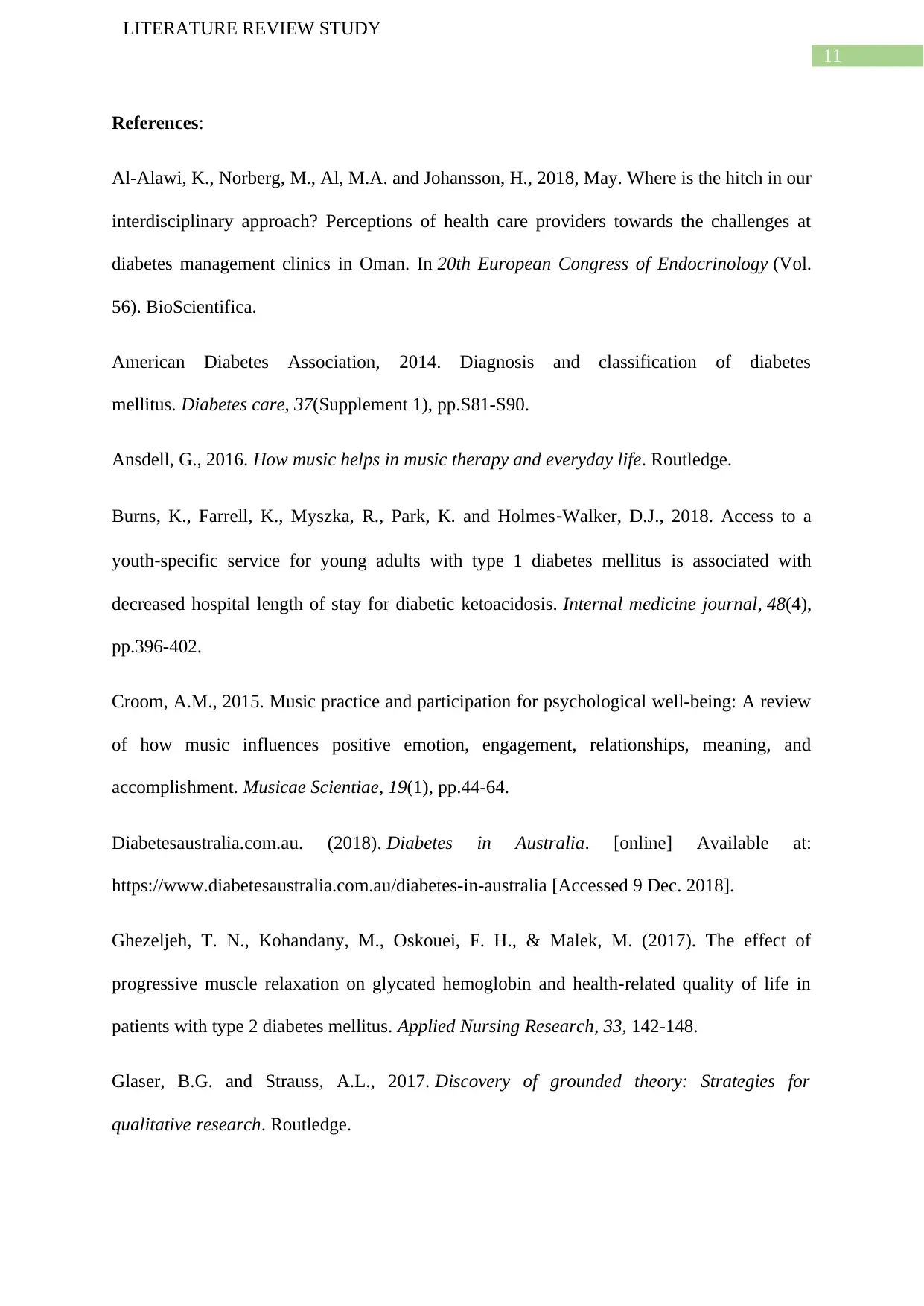
11
LITERATURE REVIEW STUDY
References:
Al-Alawi, K., Norberg, M., Al, M.A. and Johansson, H., 2018, May. Where is the hitch in our
interdisciplinary approach? Perceptions of health care providers towards the challenges at
diabetes management clinics in Oman. In 20th European Congress of Endocrinology (Vol.
56). BioScientifica.
American Diabetes Association, 2014. Diagnosis and classification of diabetes
mellitus. Diabetes care, 37(Supplement 1), pp.S81-S90.
Ansdell, G., 2016. How music helps in music therapy and everyday life. Routledge.
Burns, K., Farrell, K., Myszka, R., Park, K. and Holmes‐Walker, D.J., 2018. Access to a
youth‐specific service for young adults with type 1 diabetes mellitus is associated with
decreased hospital length of stay for diabetic ketoacidosis. Internal medicine journal, 48(4),
pp.396-402.
Croom, A.M., 2015. Music practice and participation for psychological well-being: A review
of how music influences positive emotion, engagement, relationships, meaning, and
accomplishment. Musicae Scientiae, 19(1), pp.44-64.
Diabetesaustralia.com.au. (2018). Diabetes in Australia. [online] Available at:
https://www.diabetesaustralia.com.au/diabetes-in-australia [Accessed 9 Dec. 2018].
Ghezeljeh, T. N., Kohandany, M., Oskouei, F. H., & Malek, M. (2017). The effect of
progressive muscle relaxation on glycated hemoglobin and health-related quality of life in
patients with type 2 diabetes mellitus. Applied Nursing Research, 33, 142-148.
Glaser, B.G. and Strauss, A.L., 2017. Discovery of grounded theory: Strategies for
qualitative research. Routledge.
LITERATURE REVIEW STUDY
References:
Al-Alawi, K., Norberg, M., Al, M.A. and Johansson, H., 2018, May. Where is the hitch in our
interdisciplinary approach? Perceptions of health care providers towards the challenges at
diabetes management clinics in Oman. In 20th European Congress of Endocrinology (Vol.
56). BioScientifica.
American Diabetes Association, 2014. Diagnosis and classification of diabetes
mellitus. Diabetes care, 37(Supplement 1), pp.S81-S90.
Ansdell, G., 2016. How music helps in music therapy and everyday life. Routledge.
Burns, K., Farrell, K., Myszka, R., Park, K. and Holmes‐Walker, D.J., 2018. Access to a
youth‐specific service for young adults with type 1 diabetes mellitus is associated with
decreased hospital length of stay for diabetic ketoacidosis. Internal medicine journal, 48(4),
pp.396-402.
Croom, A.M., 2015. Music practice and participation for psychological well-being: A review
of how music influences positive emotion, engagement, relationships, meaning, and
accomplishment. Musicae Scientiae, 19(1), pp.44-64.
Diabetesaustralia.com.au. (2018). Diabetes in Australia. [online] Available at:
https://www.diabetesaustralia.com.au/diabetes-in-australia [Accessed 9 Dec. 2018].
Ghezeljeh, T. N., Kohandany, M., Oskouei, F. H., & Malek, M. (2017). The effect of
progressive muscle relaxation on glycated hemoglobin and health-related quality of life in
patients with type 2 diabetes mellitus. Applied Nursing Research, 33, 142-148.
Glaser, B.G. and Strauss, A.L., 2017. Discovery of grounded theory: Strategies for
qualitative research. Routledge.
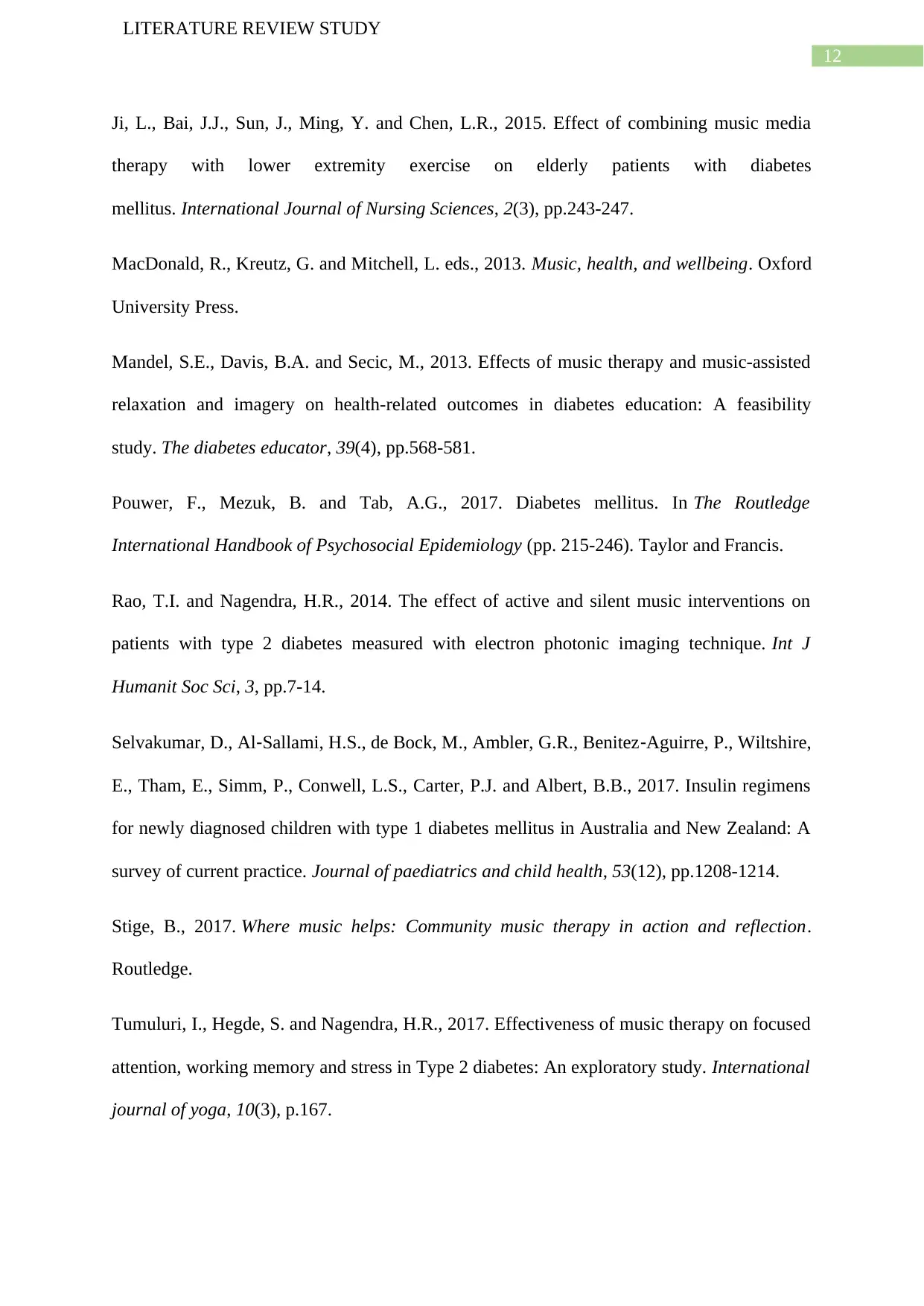
12
LITERATURE REVIEW STUDY
Ji, L., Bai, J.J., Sun, J., Ming, Y. and Chen, L.R., 2015. Effect of combining music media
therapy with lower extremity exercise on elderly patients with diabetes
mellitus. International Journal of Nursing Sciences, 2(3), pp.243-247.
MacDonald, R., Kreutz, G. and Mitchell, L. eds., 2013. Music, health, and wellbeing. Oxford
University Press.
Mandel, S.E., Davis, B.A. and Secic, M., 2013. Effects of music therapy and music-assisted
relaxation and imagery on health-related outcomes in diabetes education: A feasibility
study. The diabetes educator, 39(4), pp.568-581.
Pouwer, F., Mezuk, B. and Tab, A.G., 2017. Diabetes mellitus. In The Routledge
International Handbook of Psychosocial Epidemiology (pp. 215-246). Taylor and Francis.
Rao, T.I. and Nagendra, H.R., 2014. The effect of active and silent music interventions on
patients with type 2 diabetes measured with electron photonic imaging technique. Int J
Humanit Soc Sci, 3, pp.7-14.
Selvakumar, D., Al‐Sallami, H.S., de Bock, M., Ambler, G.R., Benitez‐Aguirre, P., Wiltshire,
E., Tham, E., Simm, P., Conwell, L.S., Carter, P.J. and Albert, B.B., 2017. Insulin regimens
for newly diagnosed children with type 1 diabetes mellitus in Australia and New Zealand: A
survey of current practice. Journal of paediatrics and child health, 53(12), pp.1208-1214.
Stige, B., 2017. Where music helps: Community music therapy in action and reflection.
Routledge.
Tumuluri, I., Hegde, S. and Nagendra, H.R., 2017. Effectiveness of music therapy on focused
attention, working memory and stress in Type 2 diabetes: An exploratory study. International
journal of yoga, 10(3), p.167.
LITERATURE REVIEW STUDY
Ji, L., Bai, J.J., Sun, J., Ming, Y. and Chen, L.R., 2015. Effect of combining music media
therapy with lower extremity exercise on elderly patients with diabetes
mellitus. International Journal of Nursing Sciences, 2(3), pp.243-247.
MacDonald, R., Kreutz, G. and Mitchell, L. eds., 2013. Music, health, and wellbeing. Oxford
University Press.
Mandel, S.E., Davis, B.A. and Secic, M., 2013. Effects of music therapy and music-assisted
relaxation and imagery on health-related outcomes in diabetes education: A feasibility
study. The diabetes educator, 39(4), pp.568-581.
Pouwer, F., Mezuk, B. and Tab, A.G., 2017. Diabetes mellitus. In The Routledge
International Handbook of Psychosocial Epidemiology (pp. 215-246). Taylor and Francis.
Rao, T.I. and Nagendra, H.R., 2014. The effect of active and silent music interventions on
patients with type 2 diabetes measured with electron photonic imaging technique. Int J
Humanit Soc Sci, 3, pp.7-14.
Selvakumar, D., Al‐Sallami, H.S., de Bock, M., Ambler, G.R., Benitez‐Aguirre, P., Wiltshire,
E., Tham, E., Simm, P., Conwell, L.S., Carter, P.J. and Albert, B.B., 2017. Insulin regimens
for newly diagnosed children with type 1 diabetes mellitus in Australia and New Zealand: A
survey of current practice. Journal of paediatrics and child health, 53(12), pp.1208-1214.
Stige, B., 2017. Where music helps: Community music therapy in action and reflection.
Routledge.
Tumuluri, I., Hegde, S. and Nagendra, H.R., 2017. Effectiveness of music therapy on focused
attention, working memory and stress in Type 2 diabetes: An exploratory study. International
journal of yoga, 10(3), p.167.
Paraphrase This Document
Need a fresh take? Get an instant paraphrase of this document with our AI Paraphraser
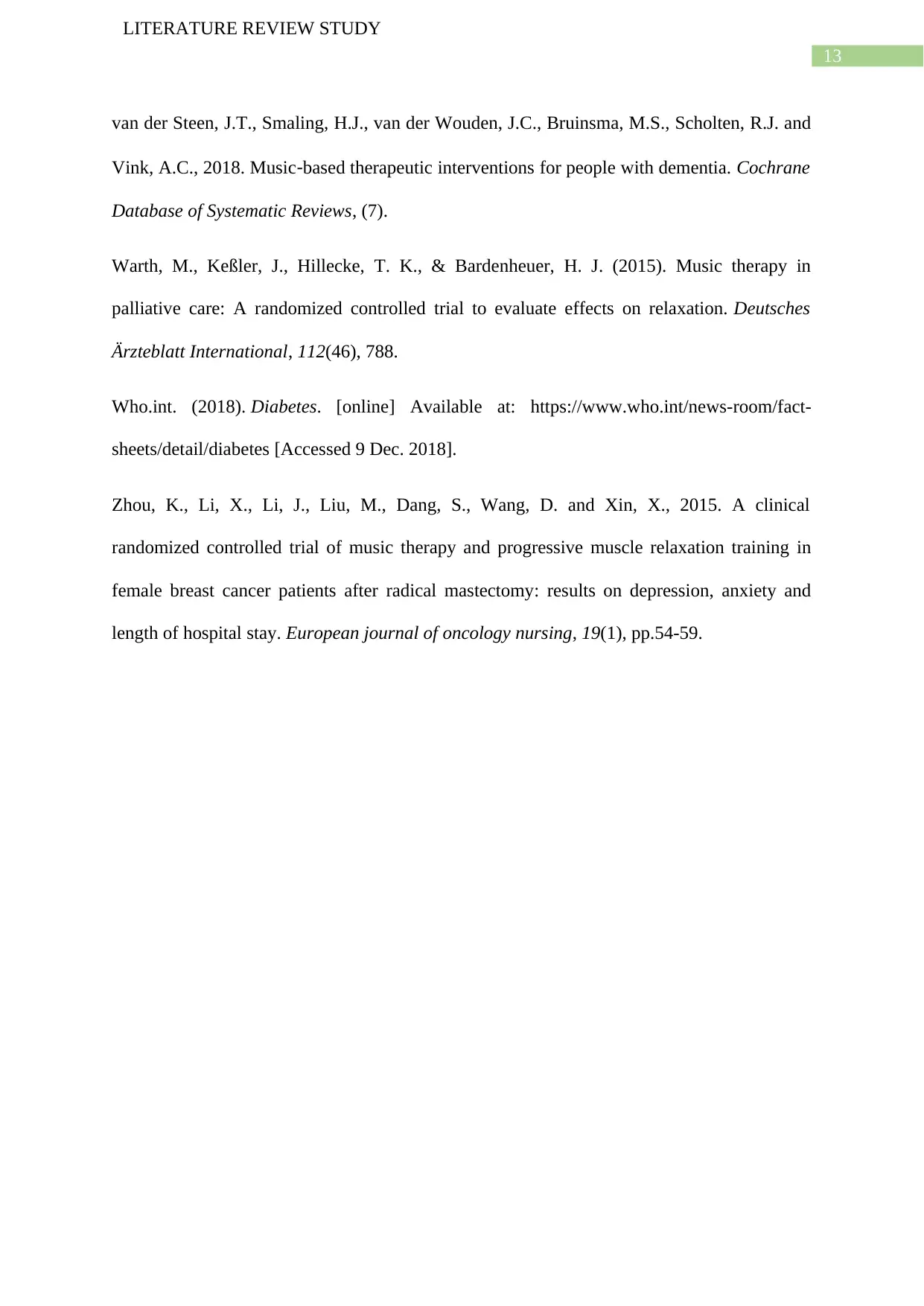
13
LITERATURE REVIEW STUDY
van der Steen, J.T., Smaling, H.J., van der Wouden, J.C., Bruinsma, M.S., Scholten, R.J. and
Vink, A.C., 2018. Music‐based therapeutic interventions for people with dementia. Cochrane
Database of Systematic Reviews, (7).
Warth, M., Keßler, J., Hillecke, T. K., & Bardenheuer, H. J. (2015). Music therapy in
palliative care: A randomized controlled trial to evaluate effects on relaxation. Deutsches
Ärzteblatt International, 112(46), 788.
Who.int. (2018). Diabetes. [online] Available at: https://www.who.int/news-room/fact-
sheets/detail/diabetes [Accessed 9 Dec. 2018].
Zhou, K., Li, X., Li, J., Liu, M., Dang, S., Wang, D. and Xin, X., 2015. A clinical
randomized controlled trial of music therapy and progressive muscle relaxation training in
female breast cancer patients after radical mastectomy: results on depression, anxiety and
length of hospital stay. European journal of oncology nursing, 19(1), pp.54-59.
LITERATURE REVIEW STUDY
van der Steen, J.T., Smaling, H.J., van der Wouden, J.C., Bruinsma, M.S., Scholten, R.J. and
Vink, A.C., 2018. Music‐based therapeutic interventions for people with dementia. Cochrane
Database of Systematic Reviews, (7).
Warth, M., Keßler, J., Hillecke, T. K., & Bardenheuer, H. J. (2015). Music therapy in
palliative care: A randomized controlled trial to evaluate effects on relaxation. Deutsches
Ärzteblatt International, 112(46), 788.
Who.int. (2018). Diabetes. [online] Available at: https://www.who.int/news-room/fact-
sheets/detail/diabetes [Accessed 9 Dec. 2018].
Zhou, K., Li, X., Li, J., Liu, M., Dang, S., Wang, D. and Xin, X., 2015. A clinical
randomized controlled trial of music therapy and progressive muscle relaxation training in
female breast cancer patients after radical mastectomy: results on depression, anxiety and
length of hospital stay. European journal of oncology nursing, 19(1), pp.54-59.
1 out of 14
Related Documents
Your All-in-One AI-Powered Toolkit for Academic Success.
+13062052269
info@desklib.com
Available 24*7 on WhatsApp / Email
![[object Object]](/_next/static/media/star-bottom.7253800d.svg)
Unlock your academic potential
© 2024 | Zucol Services PVT LTD | All rights reserved.





